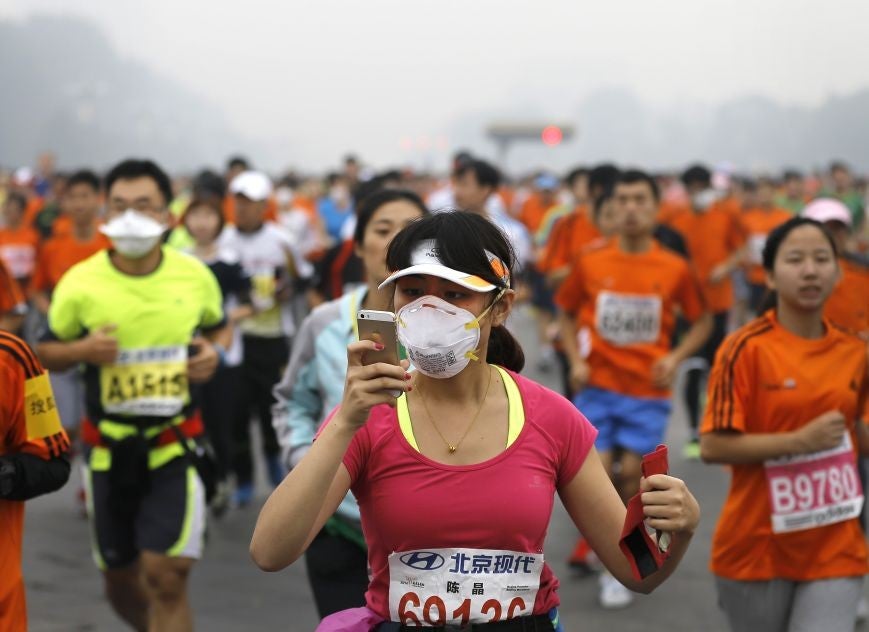Beijing's marathon might have been a depressing sight, but there's a glimmer of hope to be found amid the smog
A promising mix of greater transparency and political willpower is starting to emerge

For the past few days Beijing has once again been shrouded in a thick blanket of smog. Some runners donned face masks on the weekend to run in the Beijing Marathon and residents have been reaching for their phones to check the Air Quality Index on an hourly basis, hoping in vain for a northerly wind to blow the pollution away.
Ask most Beijingers when the best time to visit the city is and they will probably say autumn, as clear blue skies and cool breezes usually bring respite after the long sweltering summer. Unfortunately that hasn’t been the case this year. Two periods of heavy pollution have hit Beijing and the north of China over the past couple of weeks.
While there is still some debate about the make-up of China’s smog there is no disputing that industrial emissions is one major source. Thirty years of unfettered industrialisation has caused pollution problems on a massive scale throughout China, and although air pollution is the most widely reported, water and soil pollution are equally serious.
In the past there has been a tendency to ignore the problem in favour of economic development, but a more vocal and well informed public has pushed environmental issues up the political agenda, to the point where earlier this year, China’s Prime Minister, Li Keqiang, declared war on pollution.
However, weaning a country the size of China off its coal addiction and "pollute now, clean up later" attitude was never going to be easy. Even though there has been a concerted effort by the central government to strengthen environmental laws and regulations, this alone is unlikely to solve the problem. Powerful vested interests often make it difficult to punish polluters through the judicial system and local environmental authorities have limited powers of enforcement.
It’s easy to become despondent when thinking about the enormity of China’s environmental woes but there are some glimmers of hope. One is the way the general public are much more aware and engaged on environmental issues. We now have access to reliable real-time air quality data and can increasingly get information on which companies are breaking environmental laws.
China may not be renowned for transparency but there is also a definite trend towards increasing access to environmental data, and this is creating opportunities for the public to play a role in supervising the enforcement of regulations.
There are still some concerns around coverage and data reliability, but a new real-time pollutant discharge reporting system has shed valuable light on the situation. It measures the frequency and quantity of pollutants that some of the biggest emitters in China are discharging in breach of the legal standards.
Environmental NGOs like the Institute of Public and Environmental Affairs are taking this information and creating tools like the Pollution Map mobile app to help the public access this data and put pressure on companies that flout environmental laws. The central government may have declared war on pollution, but it’s only going to be through the public playing a larger supervisory role that China’s environmental regulations will be fully and widely enforced.
Matthew Collins is Project Manager at the Institute of Public and Environmental Affairs (IPE)

Join our commenting forum
Join thought-provoking conversations, follow other Independent readers and see their replies